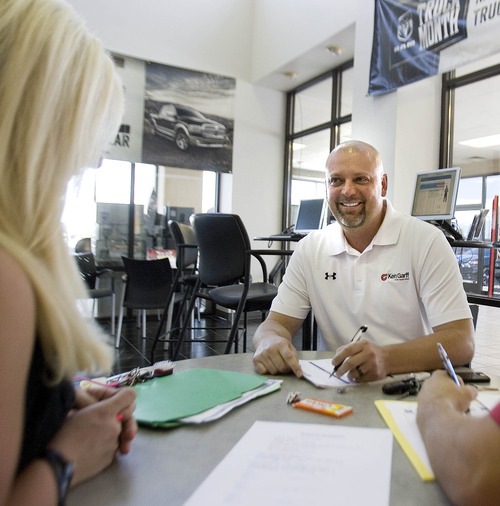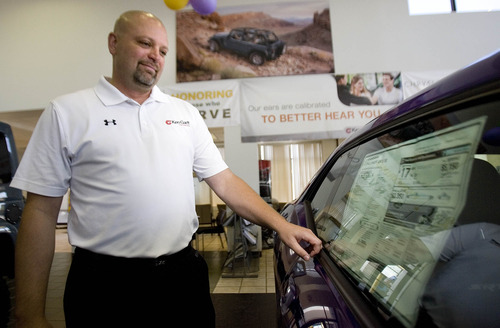This is an archived article that was published on sltrib.com in 2013, and information in the article may be outdated. It is provided only for personal research purposes and may not be reprinted.
As commuters from Stansbury Park to Salt Lake City every day, Catherine Rees and her husband started shopping for a reliable car with excellent gas mileage. After a fair bit of research, they decided on a 2013 Volkswagen Golf, and last month the couple applied for the manufacturer's advertised zero percent down, zero percent financing deal for 60 months. Volkswagen approved and countered with an even better deal, extending those same terms to a 72-month loan, which lowered their monthly car payment to $372.
Rees says they originally planned to pay cash for the car, but the deal was just too good to pass up.
"We looked at everything and thought, 'Why not? Why not use their money for free?" Rees said.
Low interest rates and reduced monthly payments are making multi-year auto loans more and more attractive to consumers. And lenders — from auto dealers to manufacturers to banks and credit unions — willing to finance a vehicle over five years or more are no longer the exception, but the rule.
According to the credit rating agency Experian, car loans now run 65 months, or nearly five-and-a-half years, on average. That compares with 59.3 months in 2002. The Experian report also notes that the average new car loan rose to $26,691 in Q4 2012, up $272 from the same period the previous year.
The upshot? Consumers are buying more expensive vehicles, but the rise of extended loan terms means lower monthly payments, says Ronald Montoya, consumer advice editor of Edmunds.com, which monitors the auto industry.
"The days of four-year loans are rare," Montoya said. "Consumers are getting more and more focused on monthly payments and getting into a loan cheap."
That certainly is the case at Ken Garff West Valley, which sells and services Chrysler, Jeep and Dodge vehicles. Sales manager Chad Hendrickson has been in the business for 14 years and says a good 50 to 60 percent of his customers now take out loans for six years and beyond. He first noticed longer loan terms after the 2008 economic downturn and says 84- and 96-month loans are now common.
"Because the cost of vehicles has been going up so much, customers are extending out their loan terms to get a lower monthly payment," Hendrickson said. "The majority aren't carrying the full term of the loan anyway, so all they care about is that monthly payment. They know they're going to trade in [their car] in the meantime."
But is stretching out a car loan really a smart financial move? It depends. Rex Rollo, America First Credit Union executive vice president and chief financial officer, says he personally would not take out a longer auto loan.
"I'm of an age where [for] the car I buy I have the capacity to make the payments and I certainly want to pay the principal down as rapidly as I can so when I sell the car I have more value," Rollo says. "But for someone younger who is worried about the amount of the payment, [a longer loan] can be used as a vehicle to get them into the car that they need."
Rollo says America First, which processed $60 million in auto loans in July, and lenders, when evaluating a customer's loan, generally look at 5 C's: collateral, credit, capacity, capital and conditions. But consumers are certainly looking out for their own interest when considering auto financing.
"[Credit union] members will say, 'I can make this type of a payment and the term may be longer so the payment is reduced, but I know I'm going to trade the car in,' so it's more a preference to the member and what their payment capacity is," Rollo says.
But longer loan terms can get some consumers in hot water. By the time you pay off the car in seven years, it may not have much resale value. A divorce or unexpected layoff could force you to sell a car for less than you owe (or less than it's worth). And taking out an extended loan means you'll spend more in interest, unless you're lucky enough to get a zero percent interest loan.
Take a $25,000 car, for example. If you put nothing down and secure a 2.99 percent annual percentage rate (APR) for a 60-month loan, your monthly payment would be $499.11 a month and you would pay $1,946 in interest. Stretching that over a 72-month period would mean a dip in the monthly payment to $379.73, but you would end up spending $2,341 in interest.
"Once buyers get to just thinking about the monthly payment, they don't tend to look at the bigger [financial] picture," Montoya of Edmunds.com said. "They will never enjoy a time without a car payment. Essentially it's a really long lease."
So should consumers consider leasing a car instead? Montoya says the mileage restrictions and damage clauses are a turn-off for many consumers.
Because of mileage restrictions, leasing was never an option for Volkwagen Golf buyer Rees; she sees her recent VW purchase as a three- or four-year transaction instead of a full 72-month loan.
"I used to have the mind-set that a car payment was just part of my budget, but now we don't sleep well if we have debt," Rees said. "We'll never keep that loan for a full 6 years. We'll probably end up just paying it in two or three."
Twitter: @jnpearce







